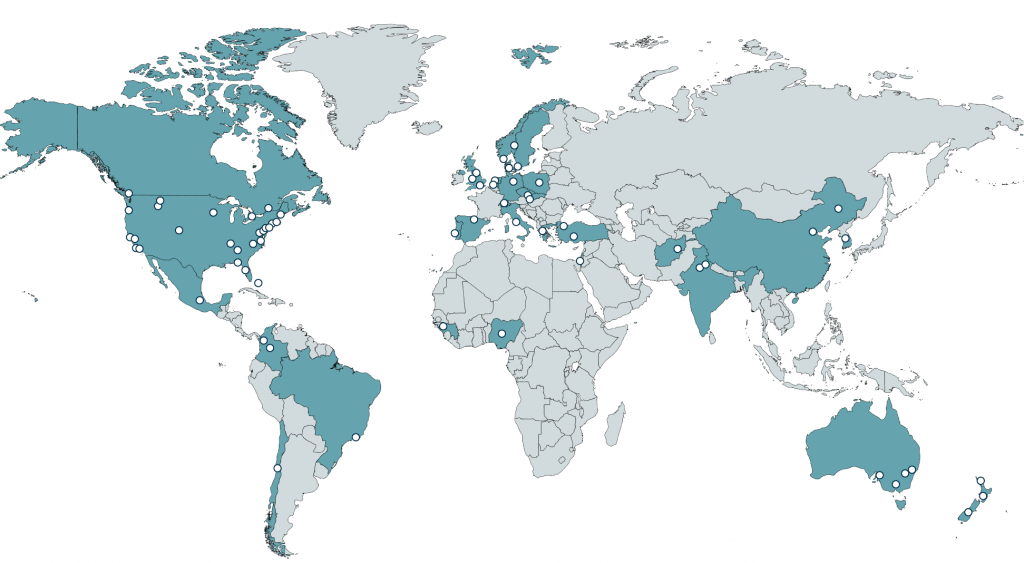What is the mind-culture nexus?

At CMAC, the mind-culture nexus denotes the phenomena that occur at the intersection and interaction of individuals with their environments. CMAC studies the mind-culture nexus because it encompasses much of the way that people operate within and perceive the world around them.
In order to gain insight into the mind-culture nexus, we draw from a number of disciplines: the sciences of minds, brains and bodies (neuroscience, cognitive psychology, evolutionary biology, medicine); the sciences of culture, society and history (sociology, anthropology, political economy, history); the computational sciences (modeling and simulation, semantic network analysis, machine learning, analysis of massive datasets); and the humanities.
What does CMAC hope to accomplish?
CMAC hopes to develop and catalyze research initiatives into the nexus of mind and culture, to become an institutional locus for understanding these phenomena, and to empower academic scholarship as well as the public with further knowledge. CMAC believes that by tapping into rich datasets and thinking creatively – with a nod to the sciences and the humanities – we can better understand the complex webs that constitute our world and unravel their knots.
What tools does CMAC use?
CMAC uses computer modeling, simulation technology, and data analytics to develop effective approaches to the issues we study, allowing research teams to evaluate proposals, predict sources of problems and test out solutions.
By bringing together a wide range of experts and connecting them with public and private institutions, CMAC can better inform strategies on such issues as illegal trafficking, security, and immigration.
Where does CMAC’s research take place?
CMAC’s projects carry global implications and our network is largely made up of collaborators and associates working around the world. In the Boston office, we employ administrative staff, postdoctoral and doctoral fellows, research assistants, and interns. The CMAC network includes more than 160 people, spanning 29 countries and 18 US states. Although 76% of the network is remote, this global collaboration nevertheless helps mentor early-career academics and enriches the work of established researchers.

What is CMAC’s relationship with existing universities?
The Center for Mind and Culture is an independent not-for-profit corporation but cultivates close relationships with surrounding colleges and universities. It was founded by two Boston University professors, with the encouragement of the university administration. Some of its research staff have affiliations at Boston University, and CMAC hires work-study students from Simmons College, Boston University, and MIT. The network of universities with which CMAC collaborates on specific research projects is much wider, extending to many parts of the world.
When was CMAC founded?
The Center for Mind and Culture was officially incorporated in February 2017. CMAC grew out of the Institute for the Biocultural Study of Religion (IBCSR), as the scope of its research broadened to many aspects of the mind-culture intersection. IBCSR was founded by neuroscientist Patrick McNamara and philosopher of religion Wesley J. Wildman in 2007.
What is IBCSR and how does it relate to CMAC?
The Institute for the Bio-Cultural Study of Religion (IBCSR) was a preexisting research organization that is now housed under CMAC’s umbrella. IBCSR conducts all of the research associated with religion. It is also a membership organization that produces IBCSR Research Review, the Religion, Brain & Behavior journal and its own newsletter. You can find IBCSR’s specific website at www.ibcsr.org.
What is CMAC’s organizational status?
CMAC is a research center headquartered in Boston, Massachusetts.
It is a nonprofit corporation under the laws of the Commonwealth of Massachusetts as of 2007, though its work predates its incorporation. As of August 20, 2007, it is a public charity with United States federal tax exemption under Section 501(c)(3) of the Internal Revenue Code.
How can I get involved?
To volunteer, please reach out to admin@mindandculture.org. To donate, please visit the ‘Donate’ button on this site’s sidebar or send checks made out to “Center for Mind and Culture” to The Center for Mind and Culture, 566 Commonwealth Avenue Suite M-2, Boston, MA 02215.
Contributions to CMAC are tax-deductible (Tax ID 26-0750389).

